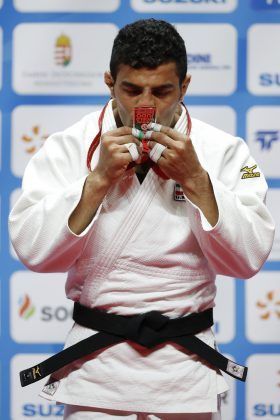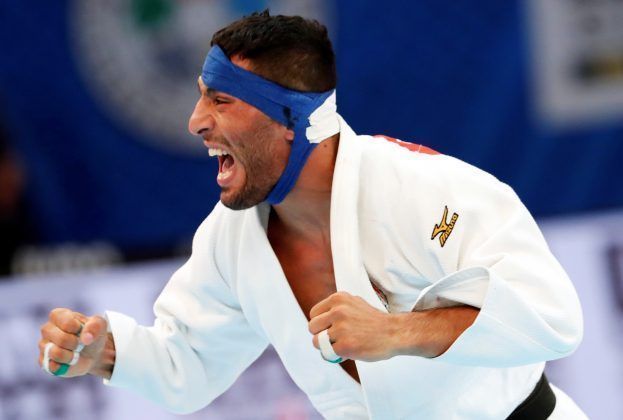By Petra Wischgoll
Sept 12 (Reuters) – Iran judoka Saeid Mollaei is hopeful of securing a spot in next year’s Tokyo Olympics even though he has refused to return to his country after defying orders from Iranian authorities to pull out of last month’s world championships.
The 2018 world champion, who has been in hiding in Germany due to fears over his safety, said both the International Judo Federation (IJF) and the International Olympic Committee (IOC) had assured him a spot in next year’s Games.
“IJF and IOC told me that they would guarantee my way to Tokyo Olympic Games next year,” Mollaei told Reuters in Farsi at an undisclosed location in Germany on Thursday.
If Iran does not include him in the Olympic team, Mollaei could potentially compete as an independent athlete under the Olympic flag after approval from the IOC.
“This is my main goal and I will do whatever I can. I have already started training. I want to go there and I want to get the only medal, which is missing in my career, which is the gold Olympic medal.”
“Probably I won’t be able to go back to my country, but I am hoping that winning an Olympic medal next year will help me and help them (family and friends) to have less suffering and difficulties.”
He said he could have added another world championship medal last month had Iran‘s sports and government officials not pressured him to pull out of his quarter-final and semi-finals in Tokyo to avoid fighting Israel’s Sagi Muki in the final.
The IJF has said both Iran‘s first deputy minister of sport and its national Olympic chief called the athlete and his entourage to order him not to compete. The IJF has said state security personnel was at his family’s home at the time.
Mollaei won his quarter-final and eventually lost in the semi-final after defying orders not to fight in either round.
“I had no choice. I had to comply with the law according to which I cannot compete with Israeli opponents,” he said.
“I was scared, I was afraid of what might happen to my family, of what might happen to me. So I lost (in the semi-final). I could win, but I lost and I decided to lose.”
The IOC said it is looking into the case and has requested a full report from the IJF.
“Lots of threats from different people and I know also that it is the same situation for my family,” he said before adding that his family have been under surveillance and their phone calls are monitored.
“I want to fight for freedom, for happiness and I want to share it with all those people who understand that we are all human beings and we are trying just to do our best in sport, in judo, that we love,” Mollaei said.
The Iranian Olympic Committee could not be immediately reached for comment.
This is not the first time athletes from Arab nations or Iran have been ordered to pull out or refuse to compete with Israeli athletes in Olympics or other international competitions.
At the 2004 Athens Olympics, then-Iranian world champion Arash Mirasmaeili refused to fight Israeli judoka Ehud Vaks, earning praise back home. At Rio in 2016, Egyptian judoka Islam El Shehaby was sent home after refusing to shake the hand of Israeli Or Sasson following the end of their bout.
Since its Islamic Revolution in 1979, Iran has refused to recognise Israel and the two have been arch-enemies for decades.
(Writing by Karolos Grohmann, editing by Pritha Sarkar)



